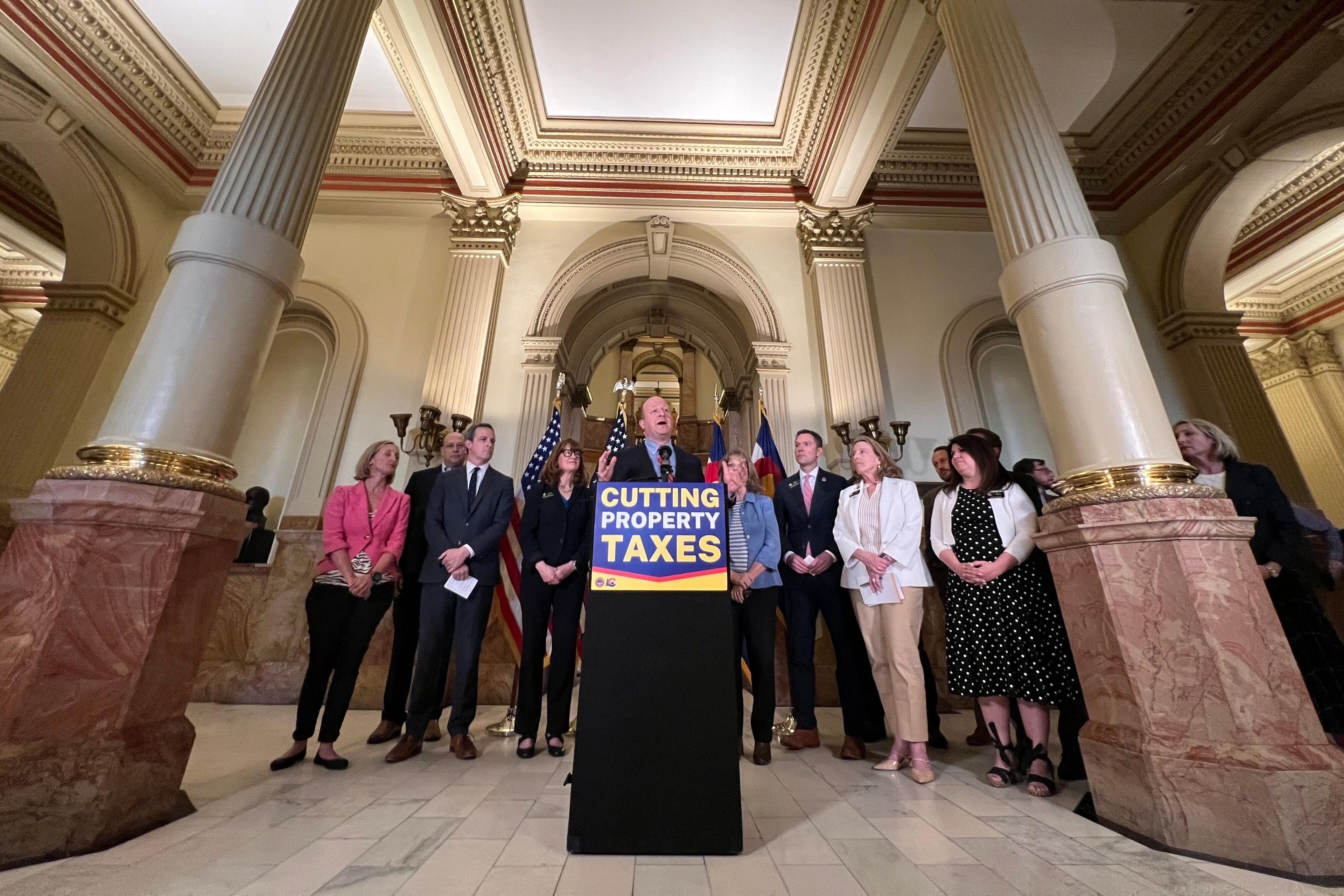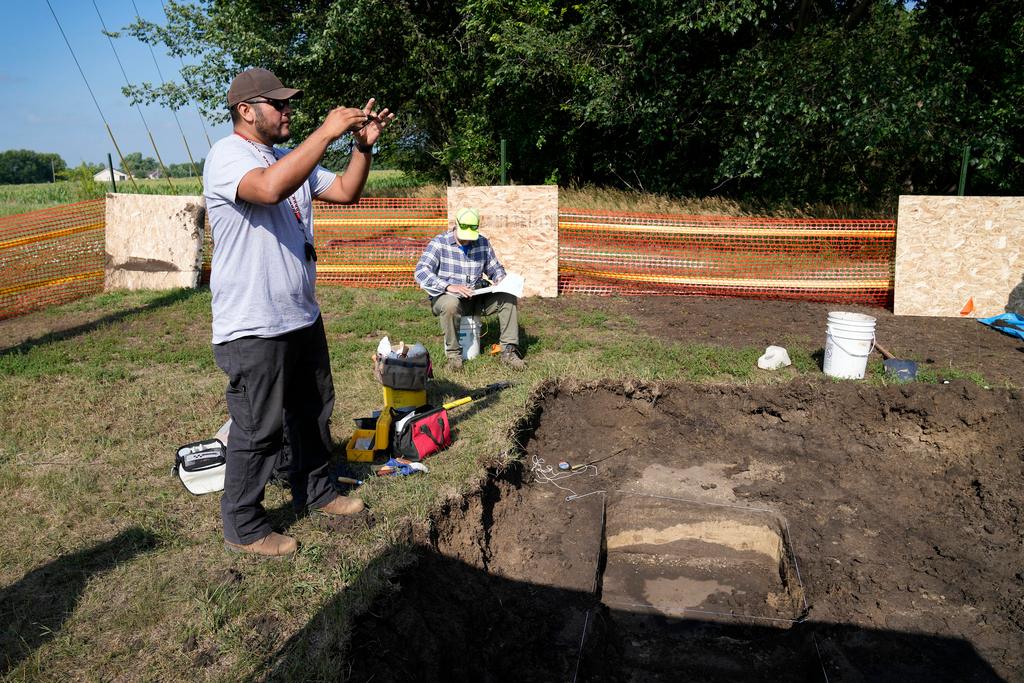
Republican and Democratic state lawmakers have joined with business interests and others on a property tax compromise that would permanently lower overall tax rates and limit the growth of certain portions of property owners’ bills.
The measure, announced Monday morning, is being introduced on the last possible day; it has less than 72 hours to pass before the legislature adjourns Wednesday night. Lawmakers hope it can provide a long-term answer to a question that has dogged the state for years.
“White smoke has emerged from the ceiling. We have agreement on cutting property taxes,” said Gov. Jared Polis, making a joking reference to the papal selection process, as he stood before a group of Democratic and Republican lawmakers.
The new bill — SB24-233 — would lower property tax payments by more than $1 billion per year, compared to the status quo, according to its backers. But, so far, it hasn't been enough to convince two influential outside groups -- representing businesses and conservatives -- to abandon their plans to put their own property tax proposals on the election ballot this November.
Under the deal:
- Commercial tax rates would be lowered over the next couple of years, making a dent in the relatively high rates that those property owners pay. The change would be permanent.
- Residential tax rates would be cut, lowering the typical home’s bills by at least a couple hundred dollars, compared to the status quo. The lower rates would be permanent.
- K-12 education funding would be somewhat unaffected because the long-term residential rate cuts would not apply to the taxes paid toward local school districts. But the state would still have to chip in $380 million to make up for the effects on schools.
- Besides schools, very few local districts will get “backfill.” In previous packages, local governments were eligible for state funding to replace some of the budgetary effects of cuts. But in this proposal, counties will only be eligible for backfill if the changes result in their budgets actually shrinking, as opposed to simply growing more slowly.
- A new limit would constrain the growth of future tax revenues. The package would include a brake that kicks in when property tax values grow too quickly. In general, districts would have to ensure that their property tax revenues don’t increase more than 5.5 percent per year. Those limits wouldn’t apply to schools, although another new policy would put a ceiling on local taxes for education.
Just six months ago, voters decisively rejected Democrats’ earlier plan to reform property taxes and state finances, known as Prop. HH. In the aftermath of that failure, several groups started working on their own ballot measures to change property taxes.
The final weeks — and hours — leading up to Monday’s announcement were marked by constant negotiations as lawmakers tried to shore up support from the business group Colorado Concern and others. That organization successfully pushed the rate cuts to be sharper and faster than originally proposed, but says it still wants more tax relief.
At the press conference, Republican and Democratic leaders put forward one of their most emphatic unity messages in recent years. It was a cross-the-aisle lovefest for the ages and a major tone shift from last fall’s Prop. HH campaign and the subsequent special session on property taxes.
“This is huge. We’re talking about a huge property tax cut for property owners without crippling our state budget,” said Republican Sen. Barbara Kirkmeyer, describing a marathon of phone calls over the weekend, including a special callout to Gov. Polis.
“I feel confident that the state can do this without using TABOR surplus, without using general fund reserves, or needing to revert back to the budget stabilization factor,” Kirkmeyer added, referring to the “BS” factor that allows the state to underfund schools.
House Minority Leader Rose Pugliese also spoke in strong support, as did Democratic legislative leaders.
“We no longer have to perceive or fear the fringes of the debate taking up the most oxygen,” said Senate President Steve Fenberg, a Democrat.
Democratic House Speaker Julie McCluskie said that minimizing the effects on school property taxes — a major source of school funding — was crucial.
“We have worked so hard to drive more funding to our public schools and we can’t back up now with a property tax compromise,” she said.
The proposal won’t necessarily result in people paying lower property taxes than they are paying today. Their taxable property value could still increase — but the rate they pay would decrease, and the growth of their taxable value would slow.
In contrast, if no changes are approved, property tax rates would actually increase in the coming years as temporary discounts expire. The savings in this package are compared to those potentially higher future rates — not to the discounted rates of today.
Colorado Municipal League, which represents Colorado's cities and towns, wants the bill to include more "backfill" money to make up for the effects on local budgets. The current proposal includes only minimal amounts of backfill for local governments -- offering the money to only a handful of rural counties that will actually see their budgets shrink as a result of the changes.
The bill now must proceed at breakneck speed — if it were introduced any later than today, it wouldn't be able to meet the three-day minimum it takes to pass legislation.
Kirkmeyer acknowledged that, once again, lawmakers are introducing a complex and impactful bill with little time for debate. But she and others defended the timing, saying that it is the culmination of a long public discussion, including the work of the bipartisan property tax commission.
“Today is the culmination of that effort,” said Democratic Sen. Chris Hansen, one of the plan’s architects. “I sometimes think we’re like procrastinating high school kids waiting for their finals week… But this is not a last-three-day bill. This is a conversation that has been going on for years.”
Republican Sen. Byron Pelton, of northeast Colorado, praised the package because of its relatively small effects on rural budgets. The formula for discounts on residential property is tailored in a way that will grant smaller discounts on the low-value properties that generally make up rural tax bases, compared to previous property tax packages.
The bill’s prime sponsors are Hansen, Kirkmeyer, Democratic Rep. Chris deGruy Kennedy, and Republican Rep. Lisa Frizell.
But it’s unclear if the package, for all its bipartisan support, will actually end the high-stakes fiscal battle.
The deal’s backers acknowledged that one key organization — Advance Colorado — was not part of the final negotiations, and the conservative group has signaled that it is still prepared to take the fight to the ballot this November if it’s not satisfied.
Advance Colorado plans "to move forward unless something significant changes with this legislation in the next two days," wrote Michael Fields, a leader for the organization. And the business group Colorado Concern has similarly said that it wants deeper tax cuts.
Advance Colorado has already secured a place on the ballot for its Initiative 50, which would put a statewide cap on property taxes. Advance Colorado and Colorado Concern also have won approval for the text of another measure, Initiative 108, although they still would have to collect signatures to put it on the ballot. Initiative 108 is expected to reduce property tax revenue by $3 billion per year, nearly triple the package introduced at the legislature today.
"We are committed to continuing to work toward a legislative solution in the final days of the session but have not removed our support for Initiatives 50 and 108," said Dave Davia, CEO of Colorado Concern, in a written statement,
Polis said the package ultimately was about finding an agreement on a long-term solution between willing parties.
“The legislature's doing what the legislature should do, which is solving the problem, making good policy. I think that takes down the temperature from everybody on the left and right,” he said.
Editor's note: This article was updated May 6, 2024 with comment from Colorado Municipal League, Advance Colorado and Colorado Concern.









